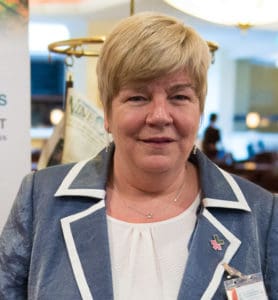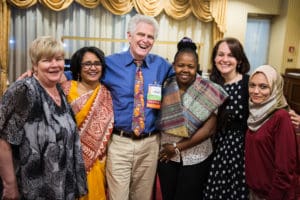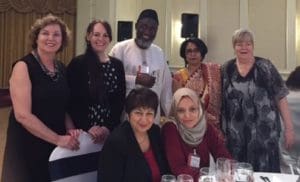MBBI Supports and Trains New Network of Women Mediators Across the Commonwealth
Women are critical to peace. Women bring a perspective often lacking in the peace negotiations and governance agreements crafted between armed factions, factions whose male-dominated narratives vary greatly from those of women, children, and the elderly. Nearly 20 years ago, the United Nations Security Council unanimously adopted Resolution 1325 on women, peace, and security, which acknowledged the disproportionate impact of armed conflict on females. Its call for the adoption of a gendered perspective in conflict stands as a significant milestone in global consensus: women ought to be participants in peace negotiations, conflict resolution, and post-conflict reconstruction.
 In the decades since Resolution 1325, advocacy for the recognition, protection, and inclusion of women before, during, and after conflicts continue. Women ranging from Mo Mowlam in Northern Ireland to Alaa Salah in Sudan serve as testaments to the slow-but-steady progress of recognizing women’s roles and participation. “As the United Nations called on countries to step up in encouraging women to be involved in peace processes, a lot of women networks began to pop-up,” says Mary Montague, MBBI’s 2015 Peacemaker of the Year.
In the decades since Resolution 1325, advocacy for the recognition, protection, and inclusion of women before, during, and after conflicts continue. Women ranging from Mo Mowlam in Northern Ireland to Alaa Salah in Sudan serve as testaments to the slow-but-steady progress of recognizing women’s roles and participation. “As the United Nations called on countries to step up in encouraging women to be involved in peace processes, a lot of women networks began to pop-up,” says Mary Montague, MBBI’s 2015 Peacemaker of the Year.
One such network is the newly-formed Women Mediators Across the Commonwealth (WMC). WMC connects women from more than 20 Commonwealth countries through a peer-to-peer network that is coordinated by Conciliation Resources and funded by the British Foreign Office. WMC has two overarching goals: first, to connect women mediators and peacebuilders; second, to advocate for the recognition of women and their participation in peace processes around the world.
https://www.youtube.com/watch?v=m_EPCuQXCIM&feature=youtu.be
MBBI became involved with WMC shortly after its conception. MBBI helped train WMC members and facilitated WMC’s first strategic planning workshop. Prabha Sankaranarayan, CEO of MBBI, says, “One of the goals of MBBI’s Women in Peacebuilding (WIP) is to build networks for these women, to leverage their efforts and to attain a community of practice.” Supporting WMC was a complimentary alignment between WIP and WMC.
 Mary Montague was one of the trainers for WMC’s London conference. Mary is herself a woman involved in peace processes–she worked as frontline peacebuilding during the Troubles in Northern Ireland, and played an active role before, during, and after the peace agreement. She went on to be a founding member of Women Waging Peace. “One of the most important things for the participants is that the trainers are practitioners,” Mary says. “People appreciate that we’re coming from a place of real experience.”
Mary Montague was one of the trainers for WMC’s London conference. Mary is herself a woman involved in peace processes–she worked as frontline peacebuilding during the Troubles in Northern Ireland, and played an active role before, during, and after the peace agreement. She went on to be a founding member of Women Waging Peace. “One of the most important things for the participants is that the trainers are practitioners,” Mary says. “People appreciate that we’re coming from a place of real experience.”
Mary, who has also been a trainer for MBBI’s WIP programs, advocates for women to first acknowledge themselves as peacebuilders–and then to be acknowledged by others, too. “WMC is a group of strong women,” she says, “doing amazingly strong work in places all around the world.” Her role with WMC was to support these women with formal mediation training.
\The training MBBI provided to WMC mirrored the success of WIP International Peace Training Institutes (IPTIs), delivered in multiple regions across the globe. “In the model, we designed [for WIP IPTIs], we give participants training, and we support them in a project on peacebuilding through mentoring and coaching,” says Mary, illustrating an experience in which she mentored four Venezuelan women via Zoom, and was able to coach them with “very practical support” in their difficult home contexts. “My principle: no matter where I go to work, I’m working myself out of a job.”
 WMC represents much more than a network for Commonwealth women. It represents the continuation of a concerted effort to include and recognize women in peacebuilding. “Women often design interventions around the needs of the community,” says Mary. She tells how, during the Troubles, it was women who were walking behind the coffins and visiting the prisons. These experiences, much like the experiences of women in conflicts around the world, were unique from those of men and were rallying cries for peace.
WMC represents much more than a network for Commonwealth women. It represents the continuation of a concerted effort to include and recognize women in peacebuilding. “Women often design interventions around the needs of the community,” says Mary. She tells how, during the Troubles, it was women who were walking behind the coffins and visiting the prisons. These experiences, much like the experiences of women in conflicts around the world, were unique from those of men and were rallying cries for peace.
“Women have a way of looking at themselves through the lens of relationships,” Mary says. “That’s why I believe in mediation. Because it restores relationships.”
Learn more about MBBI’s work with women in peacebuilding.
Article by Emily Zmak, MBBI Writer
